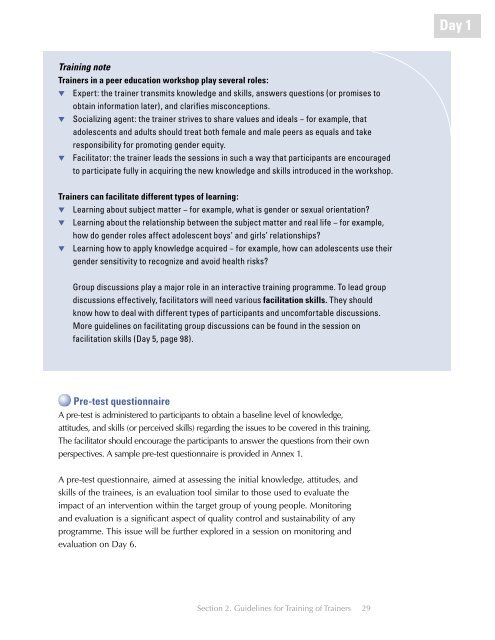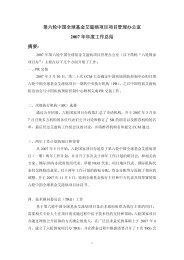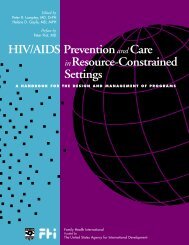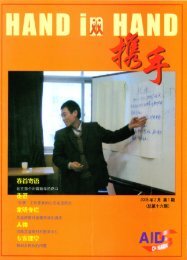The Training of Trainers Manual - UNFPA
The Training of Trainers Manual - UNFPA
The Training of Trainers Manual - UNFPA
You also want an ePaper? Increase the reach of your titles
YUMPU automatically turns print PDFs into web optimized ePapers that Google loves.
Day 1<br />
<strong>Training</strong> note<br />
<strong>Trainers</strong> in a peer education workshop play several roles:<br />
▼ Expert: the trainer transmits knowledge and skills, answers questions (or promises to<br />
obtain information later), and clarifies misconceptions.<br />
▼ Socializing agent: the trainer strives to share values and ideals − for example, that<br />
adolescents and adults should treat both female and male peers as equals and take<br />
responsibility for promoting gender equity.<br />
▼ Facilitator: the trainer leads the sessions in such a way that participants are encouraged<br />
to participate fully in acquiring the new knowledge and skills introduced in the workshop.<br />
<strong>Trainers</strong> can facilitate different types <strong>of</strong> learning:<br />
▼ Learning about subject matter − for example, what is gender or sexual orientation<br />
▼ Learning about the relationship between the subject matter and real life − for example,<br />
how do gender roles affect adolescent boys’ and girls’ relationships<br />
▼ Learning how to apply knowledge acquired − for example, how can adolescents use their<br />
gender sensitivity to recognize and avoid health risks<br />
Group discussions play a major role in an interactive training programme. To lead group<br />
discussions effectively, facilitators will need various facilitation skills. <strong>The</strong>y should<br />
know how to deal with different types <strong>of</strong> participants and uncomfortable discussions.<br />
More guidelines on facilitating group discussions can be found in the session on<br />
facilitation skills (Day 5, page 98).<br />
Pre-test questionnaire<br />
A pre-test is administered to participants to obtain a baseline level <strong>of</strong> knowledge,<br />
attitudes, and skills (or perceived skills) regarding the issues to be covered in this training.<br />
<strong>The</strong> facilitator should encourage the participants to answer the questions from their own<br />
perspectives. A sample pre-test questionnaire is provided in Annex 1.<br />
A pre-test questionnaire, aimed at assessing the initial knowledge, attitudes, and<br />
skills <strong>of</strong> the trainees, is an evaluation tool similar to those used to evaluate the<br />
impact <strong>of</strong> an intervention within the target group <strong>of</strong> young people. Monitoring<br />
and evaluation is a significant aspect <strong>of</strong> quality control and sustainability <strong>of</strong> any<br />
programme. This issue will be further explored in a session on monitoring and<br />
evaluation on Day 6.<br />
Section 2. Guidelines for <strong>Training</strong> <strong>of</strong> <strong>Trainers</strong><br />
29

















